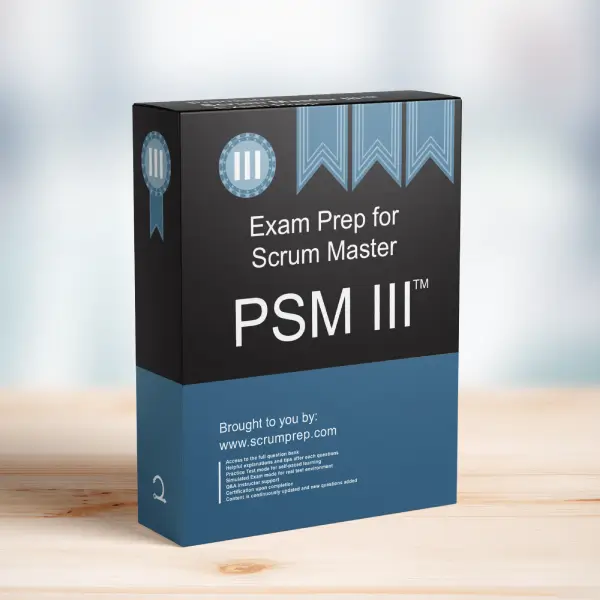Helping a Scrum Team Become Self-Managing
Self-management is a critical aspect of successful Scrum Teams, where members are empowered to make decisions, manage their own work, and collaborate effectively without relying on external command or control. The Scrum framework, with its defined rules, artifacts, commitments, events, accountabilities, and values, provides a structure that fosters self-management. Here, we will explore how three specific elements—Scrum Values, Accountabilities, and Events—contribute to helping a Scrum Team become self-managing.
Exam Question
The Scrum Guide covers the Rules of Scrum, Artifacts, Commitments, Events, Accountabilities, and the Scrum Values.
Using examples from your own experience, select three topics from the list above and describe how each element you selected will help a Scrum Team become self-managing.
Explanation
1. Scrum Values
- Courage, Focus, Commitment, Respect, and Openness: These five values are the backbone of a self-managing Scrum Team. For instance, Courage empowers team members to take on challenging tasks, make difficult decisions, and address problems openly. Focus ensures that the team concentrates on the Sprint Goal and the tasks at hand, reducing distractions. Commitment binds the team to their decisions and to each other, ensuring they work together towards common goals. Respect fosters an environment where everyone’s ideas and contributions are valued, and Openness ensures that information is shared freely, allowing the team to adapt and improve continuously.
- Example from Experience: In a previous project, our team embraced the Scrum Value of Openness by holding regular “open mic” sessions during Sprint Retrospectives. This practice allowed team members to voice concerns and share ideas without fear of judgment, leading to more innovative solutions and stronger team cohesion.
2. Accountabilities
- Clear Roles and Responsibilities: The Scrum Guide defines specific accountabilities—Product Owner, Scrum Master, and Developers. Each role has clear responsibilities that guide the team’s actions and decisions. For example, the Product Owner is accountable for maximizing the value of the product, the Scrum Master ensures that the team adheres to Scrum practices and removes impediments, and the Developers are responsible for delivering a Done Increment each Sprint. These clear accountabilities empower the team to manage their work independently, knowing who is responsible for what.
- Example from Experience: In one project, our Scrum Master took on the role of a coach, rather than a manager, which allowed the Developers to self-organize their tasks and collaborate directly with the Product Owner. This shift in responsibility helped the team become more self-reliant and efficient in their work.
3. Scrum Events
- Structured Opportunities for Collaboration and Inspection: Scrum Events—Sprint Planning, Daily Scrum, Sprint Review, and Sprint Retrospective—are designed to foster collaboration and continuous improvement. For instance, the Daily Scrum is a brief meeting where Developers discuss their progress and plan their day, ensuring alignment and transparency. The Sprint Retrospective provides a dedicated time for the team to reflect on their processes and make improvements, which is essential for self-management.
- Example from Experience: During a Sprint Retrospective in a past project, our team identified a recurring issue with communication between Developers and the Product Owner. We decided to implement a new practice where the Product Owner would join the Daily Scrum once a week. This change led to better alignment on priorities and helped the team make quicker decisions, further enhancing their self-management capabilities.
Relevance to the PSM III Exam
For the PSM III exam, it’s crucial to understand how the various elements of Scrum interact to support a self-managing team. Recognizing the importance of Scrum Values, Accountabilities, and Events in promoting self-management will help you apply these concepts effectively in real-world scenarios.
Key Takeaways
- Scrum Values such as Courage, Focus, Commitment, Respect, and Openness are essential for creating an environment that supports self-management.
- Accountabilities provide clear roles and responsibilities, empowering the team to manage their work independently.
- Scrum Events offer structured opportunities for collaboration, inspection, and adaptation, which are key to fostering a self-managing team.
Conclusion
A self-managing Scrum Team thrives when its members embrace the Scrum Values, understand their Accountabilities, and effectively utilize Scrum Events to guide their work. By applying these elements, the team can make decisions, solve problems, and continuously improve without the need for external direction. For more insights into Scrum practices and preparing for the PSM III exam, visit our Scrum Master PSM III™ Exam Prep.



